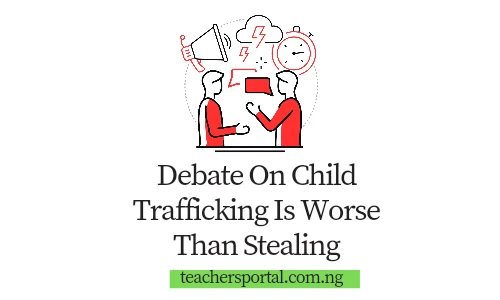In this article, we’ll be examining the debate on whether child trafficking is worse than stealing. We will also present points both for and against the topic.
For: Debate On Child Trafficking Is Worse Than Stealing
- Human Rights Violation: Child trafficking is a severe violation of basic human rights, involving the abduction and exploitation of vulnerable children. This heinous crime goes beyond the act of stealing material possessions, as it directly infringes on the well-being and freedom of innocent individuals.
- Lifelong Trauma: Child trafficking inflicts deep and often lifelong trauma on the victims. The physical, emotional, and psychological consequences endured by trafficked children are far more profound and enduring than the impact of a stolen item, making it a more severe and reprehensible offense.
- Moral and Ethical Dimensions: Child trafficking involves the moral and ethical degradation of individuals and society as a whole. It raises profound questions about the values of compassion, empathy, and human decency, making it a more morally repugnant act compared to stealing.
- Impact on Society: Child trafficking has broader societal implications, contributing to cycles of poverty, crime, and social instability. The consequences of this crime extend beyond the immediate victims, affecting communities and perpetuating negative social dynamics.
- Global Condemnation and Legal Consequences: Internationally, child trafficking is met with strong condemnation and is recognized as a grave violation of human rights. Legal consequences for involvement in child trafficking are severe, reflecting the universal recognition of its severity on a global scale.
- Violation of Innocence: Child trafficking involves the exploitation of innocence and vulnerability, as traffickers target those who are unable to protect themselves. This violation of childhood innocence amplifies the severity of child trafficking compared to stealing, which typically targets material possessions.
- Complex Web of Criminal Networks: Child trafficking often operates within a complex web of criminal networks that exploit and profit from the vulnerability of children. The sophisticated nature of these networks adds an extra layer of criminality beyond the act of stealing, making it a more intricate and challenging issue to address.
- Long-Term Societal Consequences: Child trafficking has enduring societal consequences, affecting the next generation and perpetuating cycles of trauma, poverty, and crime. The long-term impact on society, particularly in terms of compromised future generations, distinguishes it as a more far-reaching issue compared to stealing.
Against: Debate On Child Trafficking Is Worse Than Stealing
- Immediate Harm: While acknowledging the severity of child trafficking, stealing often inflicts immediate harm on the victims. It can result in financial loss, emotional distress, and a sense of violation for individuals who may be economically disadvantaged.
- Property Rights Infringement: Stealing directly infringes on an individual’s right to property. While not downplaying the seriousness of child trafficking, stealing is considered a direct violation of personal autonomy and property rights, constituting a fundamental breach in societal norms.
- Impact on Personal Security: Victims of theft may experience a heightened sense of vulnerability and insecurity in their daily lives. The violation of personal space and the fear of future theft incidents can have a significant impact on an individual’s mental well-being.
- Contributing to Economic Inequality: Stealing, especially in the context of large-scale theft or organized crime, can contribute to economic inequality by disproportionately affecting businesses and individuals with fewer resources. This can perpetuate social disparities and hinder economic development.
- Legal Consequences and Social Stigma: While child trafficking faces strong legal consequences, stealing can also result in severe legal penalties. Additionally, individuals caught stealing may face social stigma, impacting their personal and professional lives.
- Cultural and Societal Norms: In some societies, stealing is viewed as a more egregious offense due to cultural and societal norms that prioritize the sanctity of personal property. The breach of these norms can lead to severe consequences for the thief, including social ostracism and exclusion.
- Deterioration of Trust: Stealing erodes trust within communities, creating an atmosphere of suspicion and fear. The breakdown of trust can have profound social implications, affecting relationships and community cohesion in ways that may be perceived as more immediate and palpable than the consequences of child trafficking.
- Potential for Violence: Instances of stealing can escalate into violence, especially when confronted by victims or law enforcement. The potential for harm and danger associated with theft, including the use of force or weapons, adds a layer of physical risk that may be considered more immediate and tangible than some aspects of child trafficking.
